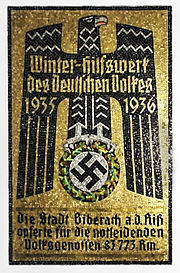This article needs additional citations for verification. (April 2014) |
Winterhilfswerk des Deutschen Volkes | |
| Abbreviation | WHW |
|---|---|
| Formation | 1933 |
| Founded at | Berlin |
| Dissolved | May 9, 1945 |
| Type | Welfare organization |
| Location | |
Region served | Germany |
| Services | Food, clothing and fuel distribution |
| Leader | Erich Hilgenfeldt |
Parent organization | National Socialist People's Welfare |
| Funding | Public contributions |

The Winterhilfswerk des Deutschen Volkes (English: Winter Relief of the German People), commonly known by its abbreviated form Winterhilfswerk (WHW), was an annual donation drive by the National Socialist People's Welfare (German: Nationalsozialistische Volkswohlfahrt) to help finance charitable work. Initially an emergency measure to support people during the Great Depression, it went on to become a major source of funding for the activities of the NSV and a major component of Germany's welfare state. Donations to the WHW, which were voluntary in name but de facto required of German citizens, supplanted tax-funded welfare institutions and freed up money for rearmament.[1][2] Furthermore, it had the propagandistic role of publicly staging the solidarity of the Volksgemeinschaft.[3]
- ^ Kramer 2017, p. 144.
- ^ Evans 2005, p. 491.
- ^ Scriba 2015.